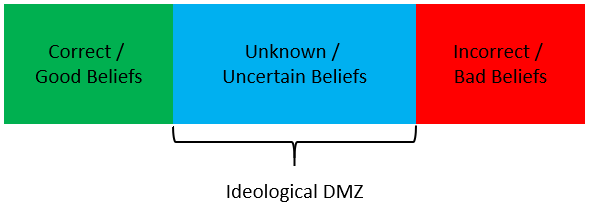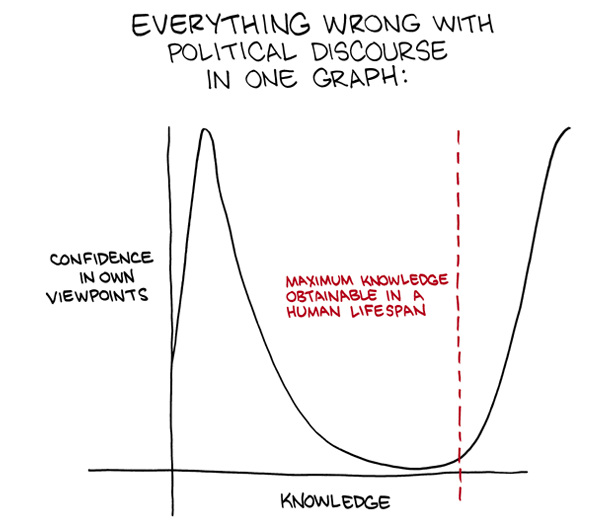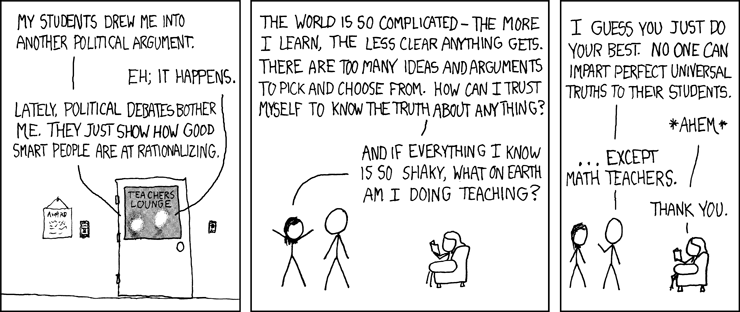I just finished reading A River in Darkness, the autobiography of a Korean-Japanese man who escaped from North Korea. It’s a tragic and engrossing read, but one detail that stuck out was the way that North Korean bureaucrats forced North Korean farmers to grow rice in ways that even a kid from urban Japan who had never studied agriculture knew were incorrect. (Basically, they planted the rice much too close together.)

It reminded me of another book, The Three-Body Problem, which depicted some of the real-life events of the Cultural Revolution in China, in particular “struggle sessions” in which Chinese professors were publicly humiliated and tortured by a mob in part for refusing to recant scientific principles that had been deemed incompatible with political doctrine.

The communists in North Korea and China were in good company. Matt Ridley, in The Origins of Virtue, recounts the Soviet Union’s own peculiar war on science:
Trofim Lysenko argued, and those who gainsaid him were shot, that wheat could be made more frost-hardy not by selection but by experience. Millions died hungry to prove him wrong. The inheritance of acquired characteristics remained in official doctrine of Soviet biology until 1964.
So in North Korea they insisted on disregarding ancient agricultural knowledge because the Party knew best, up to and including triggering massive starvation. In China they executed, exiled, and fired an entire generation of trained scientists because the Party knew best. And in the Soviet Union they insisted on trying to create frost-resistant wheat by freezing the seeds first and created even more massive starvation. Genetics, quantum mechanics, and common sense: why did the Party think they knew so much?
Let me tell you what got me thinking about this. A friend of mine posted a link to this article from Duke University’s The Chronicle detailing that a graduate program director who urged foreign students studying at Duke to speak English has been forced to step down as a result of her advice. Now, I don’t have enough information about the outrage du jour to have a strong opinion about it. As a matter of basic ethics and common sense, it’s rude and counterproductive to go to a foreign country to study and work and then hang around other people speaking your own language instead of adopting the language of the country you’ve moved to. Of course there are exceptions and I don’t generally think it’s a good idea to enforce every aspect of etiquette and common sense with formal policies, but that’s not really the point. I don’t want to take a strong position on the Duke case because I don’t know or care that much about it.
On the other hand, my friend who posted the article knew everything there is to know about it. I will not quote from the post (it was not shared publicly), but she interpreted everything through the standard lens or racism / colonialism / privilege / etc. and as a result she had zero doubts about anything. She spoke with absolute confidence and black-and-white judgment. Then all of her like-minded friends piled on, congratulating her. She knew and they knew that there was one and only explanation, one and only one answer, and that it was obvious.
I tried to engage in some discussion, leading with a simple question: have you ever lived in a foreign country and did you insist on speaking your language there? Do you even speak a foreign language? She hasn’t, so she couldn’t, and she doesn’t. (I have, I could but I did not, and I do.) Instead of considering that her view might be wrong, however, she just called for another friend to come in because they were a specialist in linguistic imperialism. So, as far as I know, this friend also has zero relevant experience but has a bigger ideological toolbox to whack people over the head with. Other commenters–even when they were polite–were just as clueless, sharing stories about growing up in bilingual homes or teaching English as a second language at the elementary school level. What do either of these things–interesting as they may be in themselves–have to do with speaking English in a graduate program? Not a single thing.
There are two things going on.
First, radical ideologies are incredibly dangerous things because they enable stupidity on a massive scale. People embrace radical ideologies because they are powerful explanation-machines. Life confronts all of us with ambiguity, complexity, and uncertainty. Also, disappointment and difficulty. Radical ideologies are a perfect antidote to the ambiguity, complexity, and uncertainty. They are, functionally speaking, fulfilling the same role that conspiracy theories do. They don’t improve your life, they aren’t meaningfully accurate, but they make your life explicable. They turn all of the randomness into order. This doesn’t actually make your situation objectively better, but it makes it feel better.
This can be relatively harmless. Radical ideology, conspiracy theories, and superstition have harmless manifestations where they don’t really do anything except waste time in exchange for a false feeling of control. Sure, you might be throwing away money to get your palm read, but it’s not really hurting anyone, right?
Sure, but things get dicier when your kooky explanation-machine happens to target, say, vaccines. Or all of modern psychiatry. Or, heck, modern medicine from start to finish. Even in these cases, the damage is limited to mostly yourself and, in particularly tragic cases, maybe your kids.
But when the explanation-machine that you’ve adopted is a political ideology, we go through a kind of phase-change and things get much, much worse.
Unlike micro explanation machines–superstition and conspiracy theories, for example–political ideologies are macro explanation machines. They have two functions. The first is the same as micro explanation machines: to quickly and easily make your life experiences intelligible. But they don’t stop there. They have a second function, and that function is to accumulate power. And that’s where things go off the rails and we get industrial-scale stupidity enabling.
To illustrate this, we have to understand why it was that Marxists in North Korea planted rice too close together, or Marxists in China executed physicists, or Marxists in the USSR kept using psuedo-science to try and grow frost-resistant wheat. You see, it wasn’t just some kind of weird accident that happened to be harmful, in the way that some people cling to harmless conspiracy theories like Bigfoot and others cling to harmful ones like the anti-vax crowd. Nope, the Marxists in North Korea, China, and the USSR were following a script laid down intentionally and inevitably by Lenin and Stalin.
Here’s philosopher Steven L. Goldman’s recounting:
This imperialism of the scientific world view—that there is such an imperialism—has a kind of, let’s call it, acute support that one doesn’t ordinarily encounter from an odd quarter, and that is from V.I. Lenin and Joseph Stalin. Before he was preoccupied with becoming the head of the government of the Union of Soviet Socialist Republics, Lenin wrote a book called Materialism and Imperio-Criticism in which he harshly criticized Ernst Mach’s philosophy of science, and other philosophies of science influenced by Mach, that denied that the object of scientific knowledge was reality—that denied that scientific knowledge was knowledge of what is real and what is true.
Lenin strongly defended a traditional—not a revolutionary—but a traditional conception of scientific knowledge, because otherwise Marxism itself becomes merely convention. In order to protect the truth of Marxist philosophy of history and of society—in order to protect to the idea that Marxist scientific materialism is “True” with a capital “T,” Lenin attacked these phenomenalistic theories, these conventionalistic theories—that we have seen defended by not just Mach, but also by Pierre Duhem, Heinrich Hertz, Henri Poincare, at about the same time that Lenin was writing Materialism and Imperio-Criticism.
Stalin in the 1930s made it clear that the theory of relativity and quantum theory, with its probability distributions as descriptions of nature—”merely” probabilistic descriptions of nature—”merely” I always say in quotation marks—that these were unacceptable in a Communist environment. Again, this is for the same reasons, because Marxist scientific materialism must be true. So, scientific theories that settle for probabilities and that are relative, are misunderstanding that special and general theories of relativity are in fact absolute and deterministic theories.
The willful stupidity of Marxist-Leninist ideology is not an accidental byproduct. It is a direct consequence of the fact that radical political ideologies are not content to be one explanation-machine among many but–as organized political movements in a battle for power–have to fight to be the explanation machine. This leads directly towards conflict between Marxist-Leninist ideology and any other contender, including both science and religion.
When these macro explanation machines aren’t killing millions of people, the absurdity can be hilarious. Here’s Goldman again:
A curious thing happened, namely that Russian physicists of the 1930s, 1940s and even into the 1950s, in books that they published on relativity and quantum theory, had to have a preface in which they made it clear that this book was not about reality—that these theories were not true, but they were very interesting and useful. It was okay to explore, but of course they’re not true because if they were, they would contradict Marxist scientific materialism.
This is quite funny because back in the 16th century, when Copernicus’ On the Revolution of the Heavenly Spheres was published in 1543, it was accompanied—unbeknownst to Copernicus, who was dying at the time—that the man who saw it through publication was a Protestant named Andreas Osiander—who stuck in a preface in order to protect Copernicus, because he knew that the Church would be upset if this theory of the heavens were taken literally. We know Galileo was in trouble for that. We talked a lot about that. So Osiander stuck in a preface saying, “You know, I don’t mean that the Earth really moves, but if you assume that it does, then look how nice and less complicated astronomy is.”
Now, I’m a religious person. I don’t think there’s any unavoidable conflict between religion and science. But when religion becomes a political ideology–as it was in the days of Copernicus and Galileo–then it is functionally equivalent to any other macro explanation machine (like Marxist-Leninism) and you will get the same absurd results (and, more often than not, the same horrific death tolls).
So here’s what I’ve learned. Human evil is never dangerous when it’s obvious. All of the great evils that we recognize today–fascism, slavery, Marxist-Leninism–were attractive in their day. And not to cackling, sinister villains rubbing their hands together with glee at the thought of inflicting evil misery on the world. Ordinary people thought that each of these monstrous evils was reasonable and, in many cases, even preferable.
If you roll that logic forward, it implies that the greatest evils of our time will be non-obvious. The movement that in 40 or 50 years from now we will revile and disavow is a movement that seems respectable and even attractive to many decent and intelligent people today. It is a macro explanation engine that appeals to people individually because it brings order to their personal narratives and–because it is functioning in the political realm–it is a macro explanation engine that will seek to crowd out all competitors and will therefore be hostile not only to alternative political ideologies but also to micro explanation engines that function in totally disparate realms like religion in science.
And, precisely because it seeks to undermine all other explanation engines even when operating in domains where it has zero utility or applicability, it will be most easily recognized in one way: as a massive enabler of stupidity.
Because that’s what happens when you have a mighty hammer. You start to see nothing but nails.








































